Equity & Trusts Case Study: Special Commissioners v Pemsel [1891]
VerifiedAdded on 2023/06/14
|9
|2462
|76
Case Study
AI Summary
This case study provides a detailed analysis of Special Commissioners of Income Tax vs Pemsel [1891] A.C. 531, a significant case in Equity and Trusts law. It explores the facts, key issues, and judgements of the case, focusing on the definition of "charitable trust" and its implications under the Income Tax Act. The study also examines the impact of the Pemsel case on subsequent legal decisions and the Charities Act 2011, highlighting Lord Macnaghten's four categories of charity. The analysis incorporates relevant legal precedents and academic perspectives, offering a comprehensive understanding of the case's context and its lasting influence on the interpretation of charitable purposes within UK law. The case study concludes that the Pemsel case provided a clear meaning of charitable purposes.
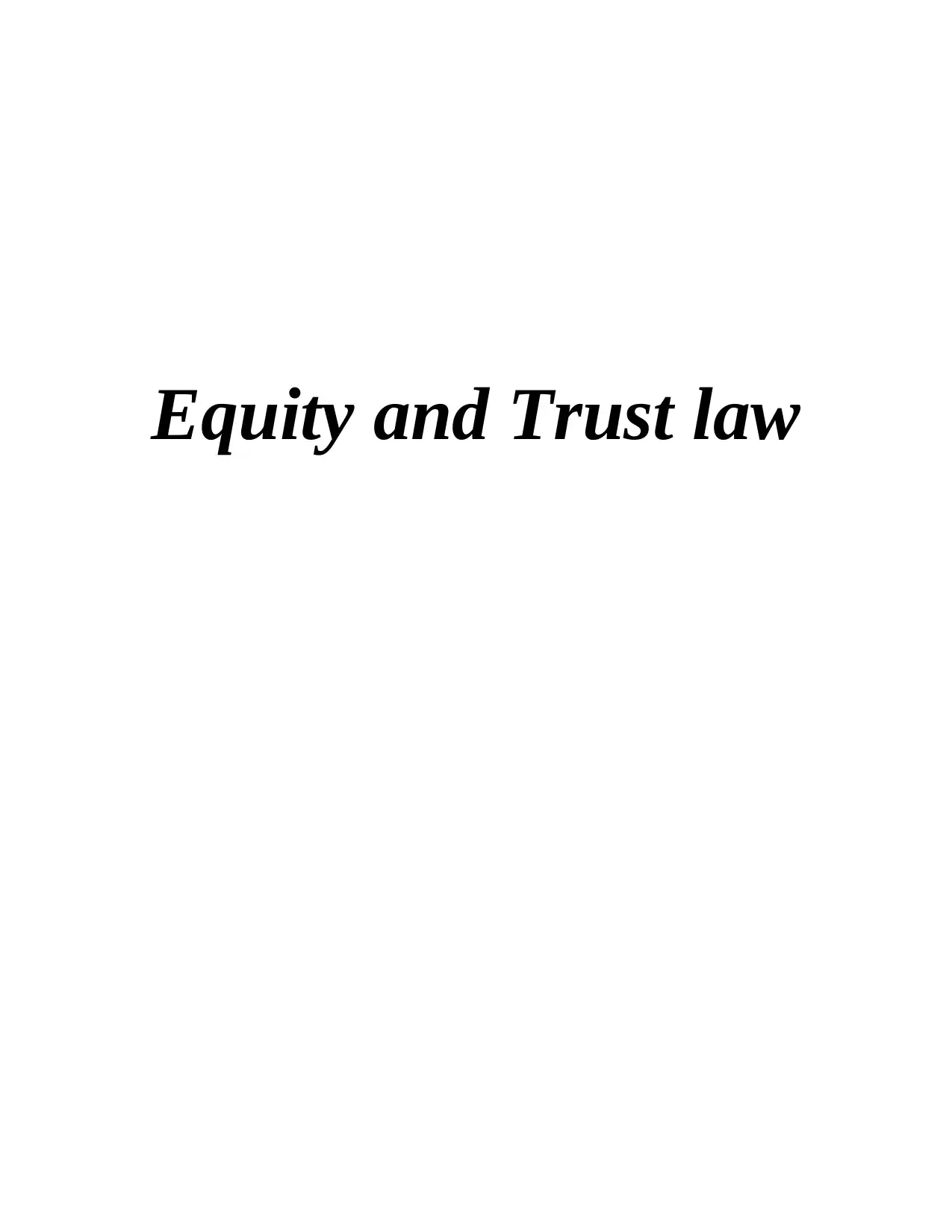
Equity and Trust law
Paraphrase This Document
Need a fresh take? Get an instant paraphrase of this document with our AI Paraphraser
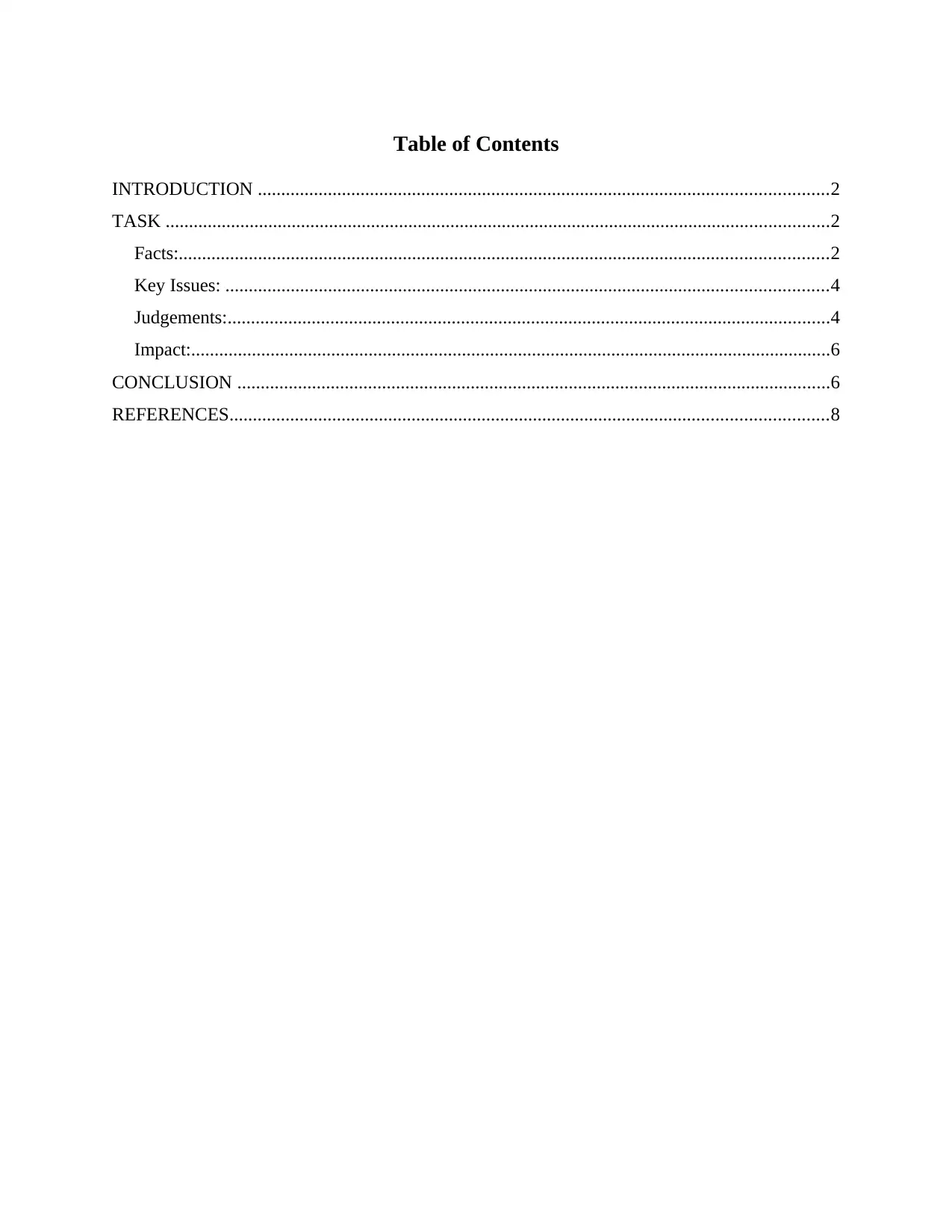
Table of Contents
INTRODUCTION ..........................................................................................................................2
TASK ..............................................................................................................................................2
Facts:...........................................................................................................................................2
Key Issues: .................................................................................................................................4
Judgements:.................................................................................................................................4
Impact:.........................................................................................................................................6
CONCLUSION ...............................................................................................................................6
REFERENCES................................................................................................................................8
INTRODUCTION ..........................................................................................................................2
TASK ..............................................................................................................................................2
Facts:...........................................................................................................................................2
Key Issues: .................................................................................................................................4
Judgements:.................................................................................................................................4
Impact:.........................................................................................................................................6
CONCLUSION ...............................................................................................................................6
REFERENCES................................................................................................................................8
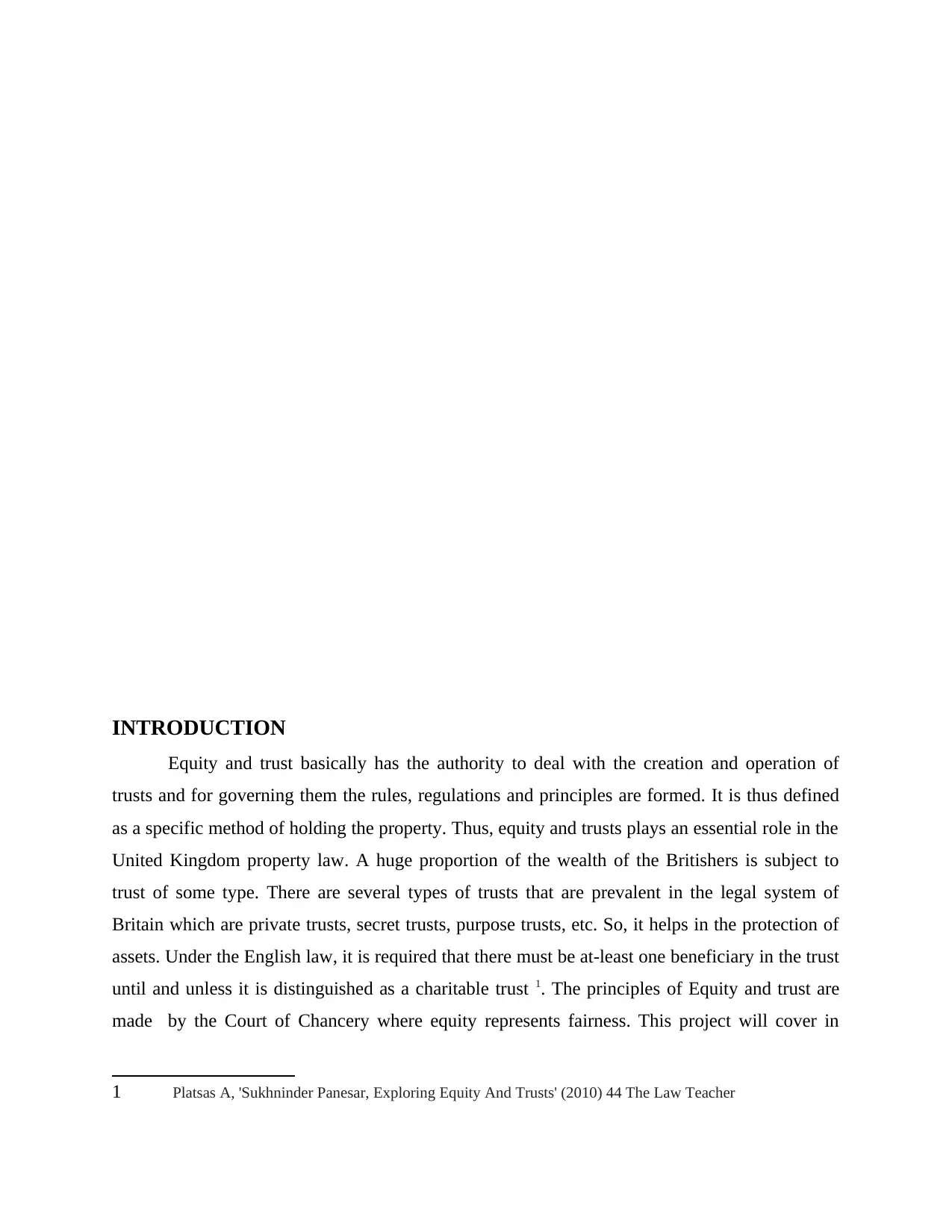
INTRODUCTION
Equity and trust basically has the authority to deal with the creation and operation of
trusts and for governing them the rules, regulations and principles are formed. It is thus defined
as a specific method of holding the property. Thus, equity and trusts plays an essential role in the
United Kingdom property law. A huge proportion of the wealth of the Britishers is subject to
trust of some type. There are several types of trusts that are prevalent in the legal system of
Britain which are private trusts, secret trusts, purpose trusts, etc. So, it helps in the protection of
assets. Under the English law, it is required that there must be at-least one beneficiary in the trust
until and unless it is distinguished as a charitable trust 1. The principles of Equity and trust are
made by the Court of Chancery where equity represents fairness. This project will cover in
1 Platsas A, 'Sukhninder Panesar, Exploring Equity And Trusts' (2010) 44 The Law Teacher
Equity and trust basically has the authority to deal with the creation and operation of
trusts and for governing them the rules, regulations and principles are formed. It is thus defined
as a specific method of holding the property. Thus, equity and trusts plays an essential role in the
United Kingdom property law. A huge proportion of the wealth of the Britishers is subject to
trust of some type. There are several types of trusts that are prevalent in the legal system of
Britain which are private trusts, secret trusts, purpose trusts, etc. So, it helps in the protection of
assets. Under the English law, it is required that there must be at-least one beneficiary in the trust
until and unless it is distinguished as a charitable trust 1. The principles of Equity and trust are
made by the Court of Chancery where equity represents fairness. This project will cover in
1 Platsas A, 'Sukhninder Panesar, Exploring Equity And Trusts' (2010) 44 The Law Teacher
⊘ This is a preview!⊘
Do you want full access?
Subscribe today to unlock all pages.

Trusted by 1+ million students worldwide
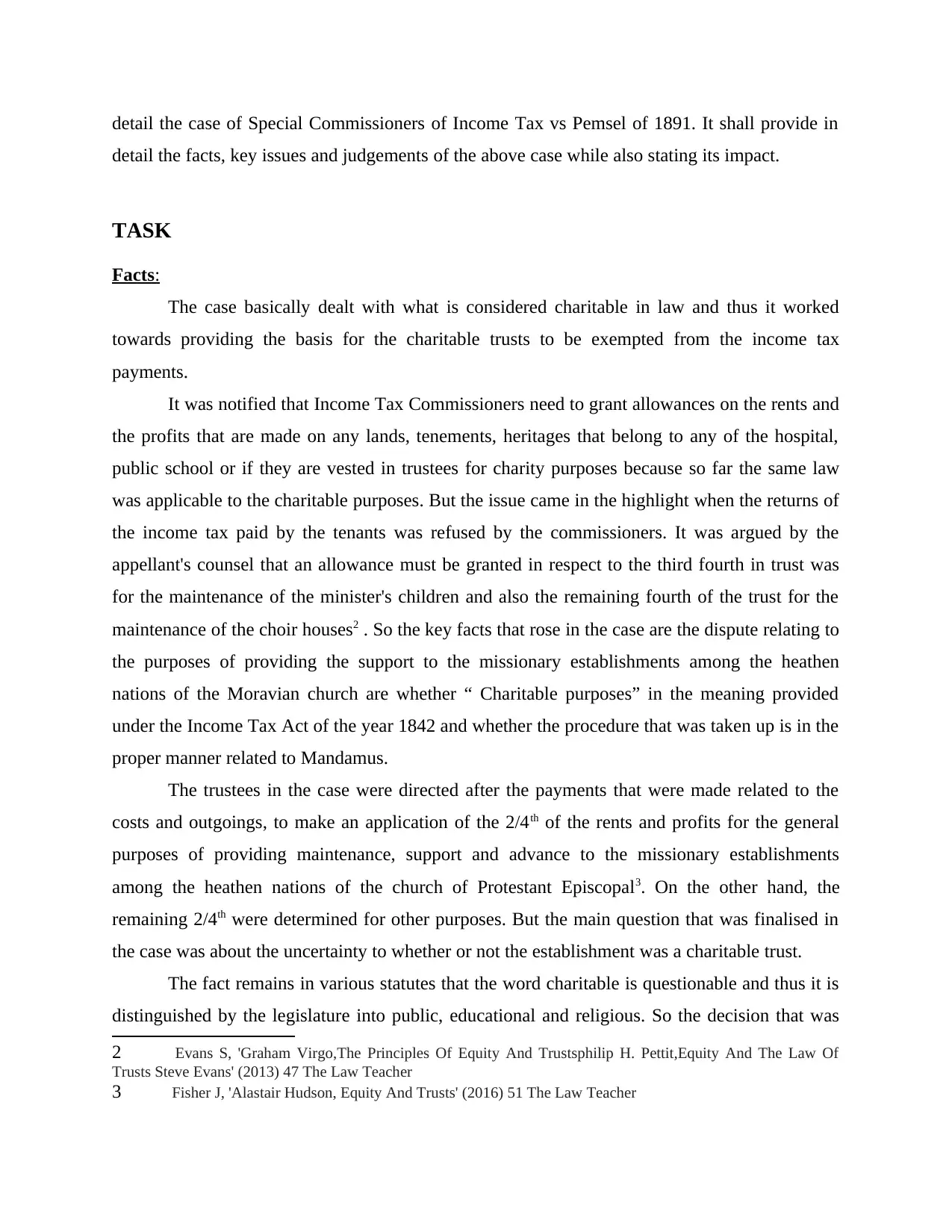
detail the case of Special Commissioners of Income Tax vs Pemsel of 1891. It shall provide in
detail the facts, key issues and judgements of the above case while also stating its impact.
TASK
Facts:
The case basically dealt with what is considered charitable in law and thus it worked
towards providing the basis for the charitable trusts to be exempted from the income tax
payments.
It was notified that Income Tax Commissioners need to grant allowances on the rents and
the profits that are made on any lands, tenements, heritages that belong to any of the hospital,
public school or if they are vested in trustees for charity purposes because so far the same law
was applicable to the charitable purposes. But the issue came in the highlight when the returns of
the income tax paid by the tenants was refused by the commissioners. It was argued by the
appellant's counsel that an allowance must be granted in respect to the third fourth in trust was
for the maintenance of the minister's children and also the remaining fourth of the trust for the
maintenance of the choir houses2 . So the key facts that rose in the case are the dispute relating to
the purposes of providing the support to the missionary establishments among the heathen
nations of the Moravian church are whether “ Charitable purposes” in the meaning provided
under the Income Tax Act of the year 1842 and whether the procedure that was taken up is in the
proper manner related to Mandamus.
The trustees in the case were directed after the payments that were made related to the
costs and outgoings, to make an application of the 2/4th of the rents and profits for the general
purposes of providing maintenance, support and advance to the missionary establishments
among the heathen nations of the church of Protestant Episcopal3. On the other hand, the
remaining 2/4th were determined for other purposes. But the main question that was finalised in
the case was about the uncertainty to whether or not the establishment was a charitable trust.
The fact remains in various statutes that the word charitable is questionable and thus it is
distinguished by the legislature into public, educational and religious. So the decision that was
2 Evans S, 'Graham Virgo,The Principles Of Equity And Trustsphilip H. Pettit,Equity And The Law Of
Trusts Steve Evans' (2013) 47 The Law Teacher
3 Fisher J, 'Alastair Hudson, Equity And Trusts' (2016) 51 The Law Teacher
detail the facts, key issues and judgements of the above case while also stating its impact.
TASK
Facts:
The case basically dealt with what is considered charitable in law and thus it worked
towards providing the basis for the charitable trusts to be exempted from the income tax
payments.
It was notified that Income Tax Commissioners need to grant allowances on the rents and
the profits that are made on any lands, tenements, heritages that belong to any of the hospital,
public school or if they are vested in trustees for charity purposes because so far the same law
was applicable to the charitable purposes. But the issue came in the highlight when the returns of
the income tax paid by the tenants was refused by the commissioners. It was argued by the
appellant's counsel that an allowance must be granted in respect to the third fourth in trust was
for the maintenance of the minister's children and also the remaining fourth of the trust for the
maintenance of the choir houses2 . So the key facts that rose in the case are the dispute relating to
the purposes of providing the support to the missionary establishments among the heathen
nations of the Moravian church are whether “ Charitable purposes” in the meaning provided
under the Income Tax Act of the year 1842 and whether the procedure that was taken up is in the
proper manner related to Mandamus.
The trustees in the case were directed after the payments that were made related to the
costs and outgoings, to make an application of the 2/4th of the rents and profits for the general
purposes of providing maintenance, support and advance to the missionary establishments
among the heathen nations of the church of Protestant Episcopal3. On the other hand, the
remaining 2/4th were determined for other purposes. But the main question that was finalised in
the case was about the uncertainty to whether or not the establishment was a charitable trust.
The fact remains in various statutes that the word charitable is questionable and thus it is
distinguished by the legislature into public, educational and religious. So the decision that was
2 Evans S, 'Graham Virgo,The Principles Of Equity And Trustsphilip H. Pettit,Equity And The Law Of
Trusts Steve Evans' (2013) 47 The Law Teacher
3 Fisher J, 'Alastair Hudson, Equity And Trusts' (2016) 51 The Law Teacher
Paraphrase This Document
Need a fresh take? Get an instant paraphrase of this document with our AI Paraphraser
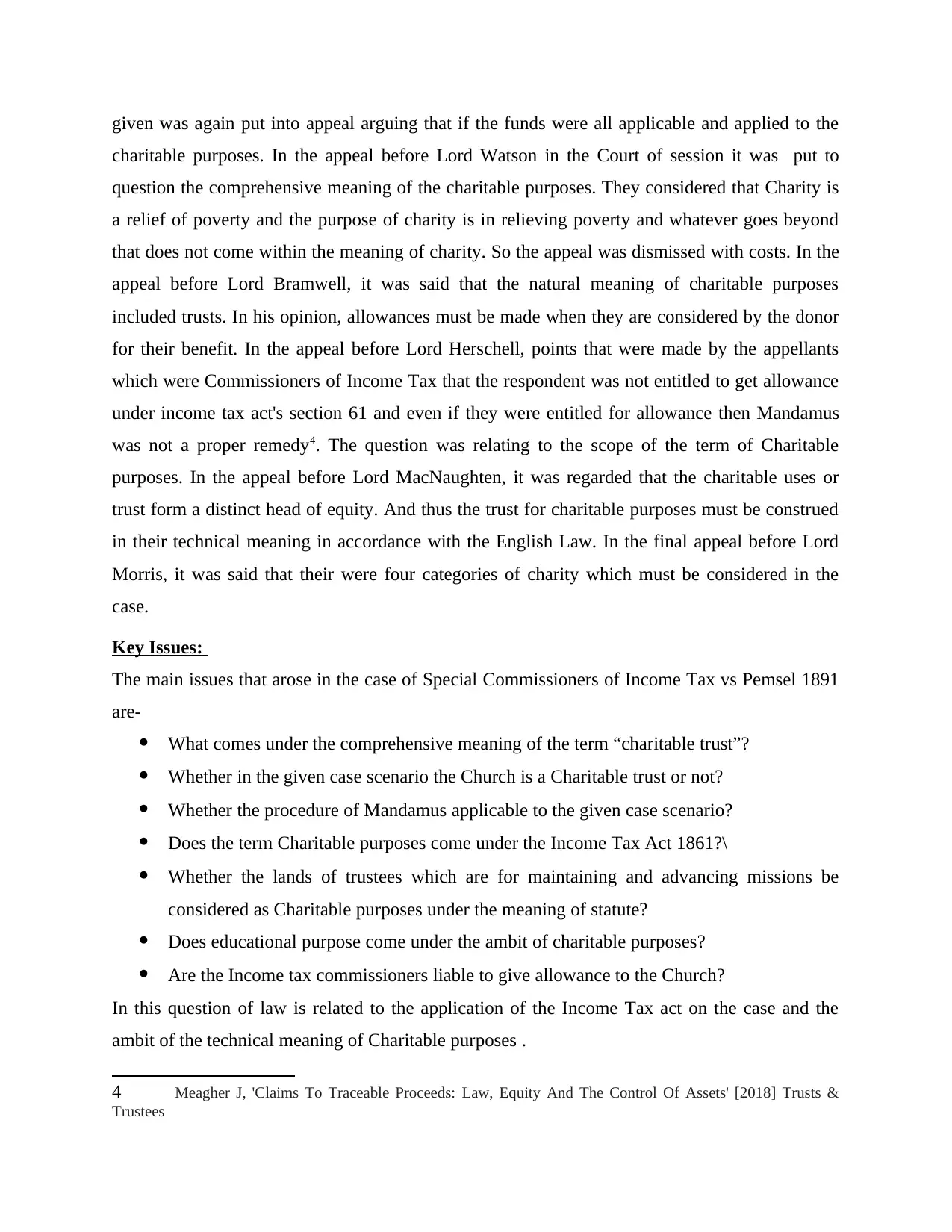
given was again put into appeal arguing that if the funds were all applicable and applied to the
charitable purposes. In the appeal before Lord Watson in the Court of session it was put to
question the comprehensive meaning of the charitable purposes. They considered that Charity is
a relief of poverty and the purpose of charity is in relieving poverty and whatever goes beyond
that does not come within the meaning of charity. So the appeal was dismissed with costs. In the
appeal before Lord Bramwell, it was said that the natural meaning of charitable purposes
included trusts. In his opinion, allowances must be made when they are considered by the donor
for their benefit. In the appeal before Lord Herschell, points that were made by the appellants
which were Commissioners of Income Tax that the respondent was not entitled to get allowance
under income tax act's section 61 and even if they were entitled for allowance then Mandamus
was not a proper remedy4. The question was relating to the scope of the term of Charitable
purposes. In the appeal before Lord MacNaughten, it was regarded that the charitable uses or
trust form a distinct head of equity. And thus the trust for charitable purposes must be construed
in their technical meaning in accordance with the English Law. In the final appeal before Lord
Morris, it was said that their were four categories of charity which must be considered in the
case.
Key Issues:
The main issues that arose in the case of Special Commissioners of Income Tax vs Pemsel 1891
are-
What comes under the comprehensive meaning of the term “charitable trust”?
Whether in the given case scenario the Church is a Charitable trust or not?
Whether the procedure of Mandamus applicable to the given case scenario?
Does the term Charitable purposes come under the Income Tax Act 1861?\
Whether the lands of trustees which are for maintaining and advancing missions be
considered as Charitable purposes under the meaning of statute?
Does educational purpose come under the ambit of charitable purposes?
Are the Income tax commissioners liable to give allowance to the Church?
In this question of law is related to the application of the Income Tax act on the case and the
ambit of the technical meaning of Charitable purposes .
4 Meagher J, 'Claims To Traceable Proceeds: Law, Equity And The Control Of Assets' [2018] Trusts &
Trustees
charitable purposes. In the appeal before Lord Watson in the Court of session it was put to
question the comprehensive meaning of the charitable purposes. They considered that Charity is
a relief of poverty and the purpose of charity is in relieving poverty and whatever goes beyond
that does not come within the meaning of charity. So the appeal was dismissed with costs. In the
appeal before Lord Bramwell, it was said that the natural meaning of charitable purposes
included trusts. In his opinion, allowances must be made when they are considered by the donor
for their benefit. In the appeal before Lord Herschell, points that were made by the appellants
which were Commissioners of Income Tax that the respondent was not entitled to get allowance
under income tax act's section 61 and even if they were entitled for allowance then Mandamus
was not a proper remedy4. The question was relating to the scope of the term of Charitable
purposes. In the appeal before Lord MacNaughten, it was regarded that the charitable uses or
trust form a distinct head of equity. And thus the trust for charitable purposes must be construed
in their technical meaning in accordance with the English Law. In the final appeal before Lord
Morris, it was said that their were four categories of charity which must be considered in the
case.
Key Issues:
The main issues that arose in the case of Special Commissioners of Income Tax vs Pemsel 1891
are-
What comes under the comprehensive meaning of the term “charitable trust”?
Whether in the given case scenario the Church is a Charitable trust or not?
Whether the procedure of Mandamus applicable to the given case scenario?
Does the term Charitable purposes come under the Income Tax Act 1861?\
Whether the lands of trustees which are for maintaining and advancing missions be
considered as Charitable purposes under the meaning of statute?
Does educational purpose come under the ambit of charitable purposes?
Are the Income tax commissioners liable to give allowance to the Church?
In this question of law is related to the application of the Income Tax act on the case and the
ambit of the technical meaning of Charitable purposes .
4 Meagher J, 'Claims To Traceable Proceeds: Law, Equity And The Control Of Assets' [2018] Trusts &
Trustees
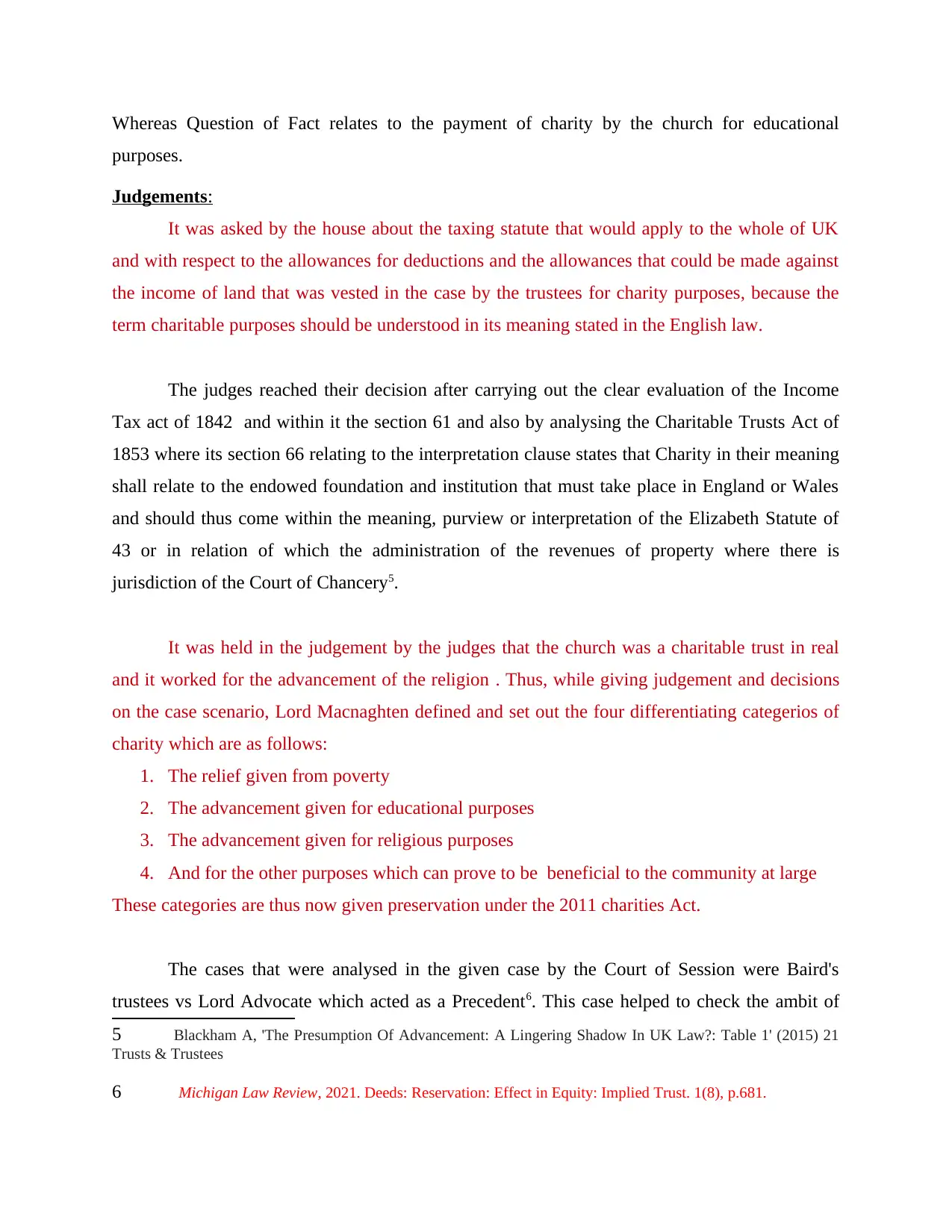
Whereas Question of Fact relates to the payment of charity by the church for educational
purposes.
Judgements:
It was asked by the house about the taxing statute that would apply to the whole of UK
and with respect to the allowances for deductions and the allowances that could be made against
the income of land that was vested in the case by the trustees for charity purposes, because the
term charitable purposes should be understood in its meaning stated in the English law.
The judges reached their decision after carrying out the clear evaluation of the Income
Tax act of 1842 and within it the section 61 and also by analysing the Charitable Trusts Act of
1853 where its section 66 relating to the interpretation clause states that Charity in their meaning
shall relate to the endowed foundation and institution that must take place in England or Wales
and should thus come within the meaning, purview or interpretation of the Elizabeth Statute of
43 or in relation of which the administration of the revenues of property where there is
jurisdiction of the Court of Chancery5.
It was held in the judgement by the judges that the church was a charitable trust in real
and it worked for the advancement of the religion . Thus, while giving judgement and decisions
on the case scenario, Lord Macnaghten defined and set out the four differentiating categerios of
charity which are as follows:
1. The relief given from poverty
2. The advancement given for educational purposes
3. The advancement given for religious purposes
4. And for the other purposes which can prove to be beneficial to the community at large
These categories are thus now given preservation under the 2011 charities Act.
The cases that were analysed in the given case by the Court of Session were Baird's
trustees vs Lord Advocate which acted as a Precedent6. This case helped to check the ambit of
5 Blackham A, 'The Presumption Of Advancement: A Lingering Shadow In UK Law?: Table 1' (2015) 21
Trusts & Trustees
6 Michigan Law Review, 2021. Deeds: Reservation: Effect in Equity: Implied Trust. 1(8), p.681.
purposes.
Judgements:
It was asked by the house about the taxing statute that would apply to the whole of UK
and with respect to the allowances for deductions and the allowances that could be made against
the income of land that was vested in the case by the trustees for charity purposes, because the
term charitable purposes should be understood in its meaning stated in the English law.
The judges reached their decision after carrying out the clear evaluation of the Income
Tax act of 1842 and within it the section 61 and also by analysing the Charitable Trusts Act of
1853 where its section 66 relating to the interpretation clause states that Charity in their meaning
shall relate to the endowed foundation and institution that must take place in England or Wales
and should thus come within the meaning, purview or interpretation of the Elizabeth Statute of
43 or in relation of which the administration of the revenues of property where there is
jurisdiction of the Court of Chancery5.
It was held in the judgement by the judges that the church was a charitable trust in real
and it worked for the advancement of the religion . Thus, while giving judgement and decisions
on the case scenario, Lord Macnaghten defined and set out the four differentiating categerios of
charity which are as follows:
1. The relief given from poverty
2. The advancement given for educational purposes
3. The advancement given for religious purposes
4. And for the other purposes which can prove to be beneficial to the community at large
These categories are thus now given preservation under the 2011 charities Act.
The cases that were analysed in the given case by the Court of Session were Baird's
trustees vs Lord Advocate which acted as a Precedent6. This case helped to check the ambit of
5 Blackham A, 'The Presumption Of Advancement: A Lingering Shadow In UK Law?: Table 1' (2015) 21
Trusts & Trustees
6 Michigan Law Review, 2021. Deeds: Reservation: Effect in Equity: Implied Trust. 1(8), p.681.
⊘ This is a preview!⊘
Do you want full access?
Subscribe today to unlock all pages.

Trusted by 1+ million students worldwide
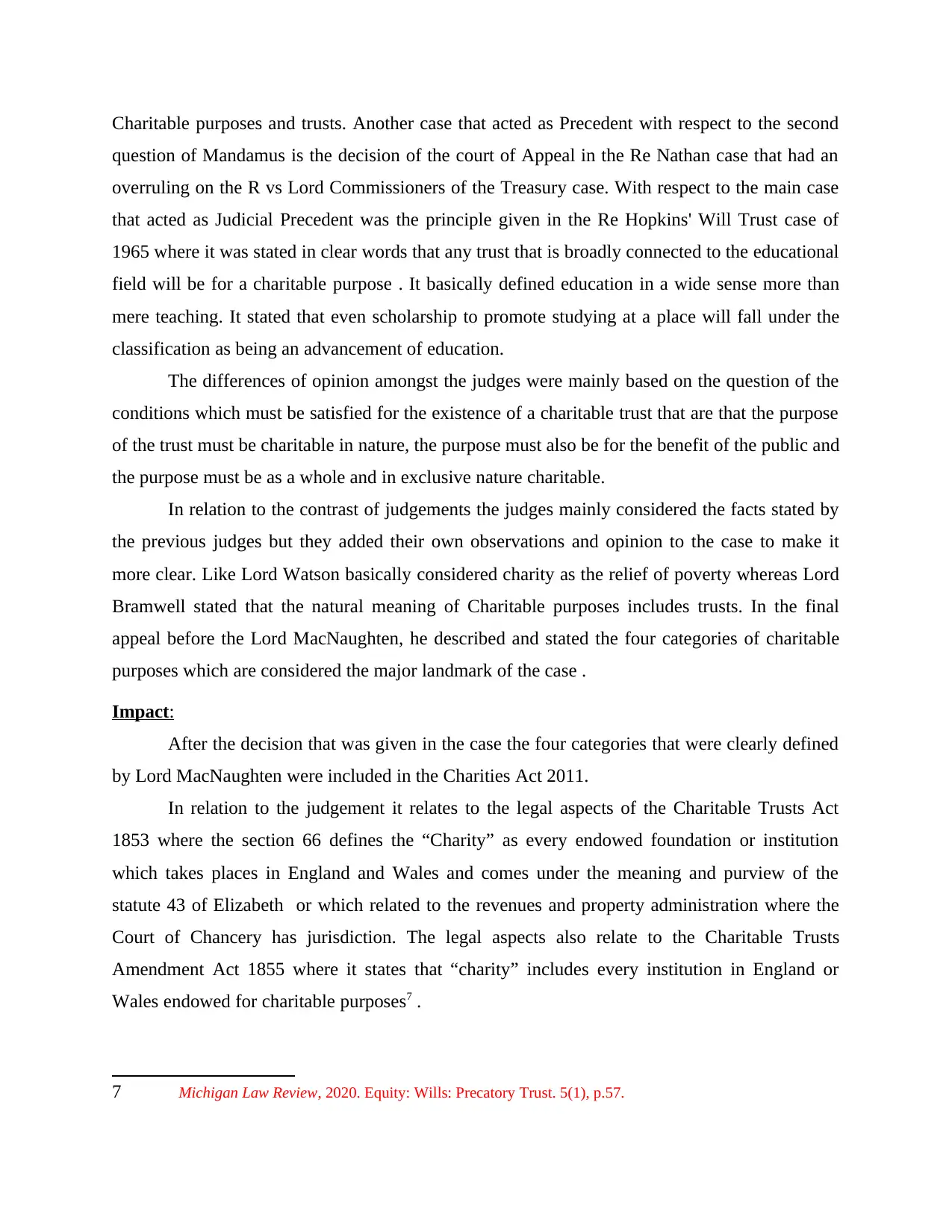
Charitable purposes and trusts. Another case that acted as Precedent with respect to the second
question of Mandamus is the decision of the court of Appeal in the Re Nathan case that had an
overruling on the R vs Lord Commissioners of the Treasury case. With respect to the main case
that acted as Judicial Precedent was the principle given in the Re Hopkins' Will Trust case of
1965 where it was stated in clear words that any trust that is broadly connected to the educational
field will be for a charitable purpose . It basically defined education in a wide sense more than
mere teaching. It stated that even scholarship to promote studying at a place will fall under the
classification as being an advancement of education.
The differences of opinion amongst the judges were mainly based on the question of the
conditions which must be satisfied for the existence of a charitable trust that are that the purpose
of the trust must be charitable in nature, the purpose must also be for the benefit of the public and
the purpose must be as a whole and in exclusive nature charitable.
In relation to the contrast of judgements the judges mainly considered the facts stated by
the previous judges but they added their own observations and opinion to the case to make it
more clear. Like Lord Watson basically considered charity as the relief of poverty whereas Lord
Bramwell stated that the natural meaning of Charitable purposes includes trusts. In the final
appeal before the Lord MacNaughten, he described and stated the four categories of charitable
purposes which are considered the major landmark of the case .
Impact:
After the decision that was given in the case the four categories that were clearly defined
by Lord MacNaughten were included in the Charities Act 2011.
In relation to the judgement it relates to the legal aspects of the Charitable Trusts Act
1853 where the section 66 defines the “Charity” as every endowed foundation or institution
which takes places in England and Wales and comes under the meaning and purview of the
statute 43 of Elizabeth or which related to the revenues and property administration where the
Court of Chancery has jurisdiction. The legal aspects also relate to the Charitable Trusts
Amendment Act 1855 where it states that “charity” includes every institution in England or
Wales endowed for charitable purposes7 .
7 Michigan Law Review, 2020. Equity: Wills: Precatory Trust. 5(1), p.57.
question of Mandamus is the decision of the court of Appeal in the Re Nathan case that had an
overruling on the R vs Lord Commissioners of the Treasury case. With respect to the main case
that acted as Judicial Precedent was the principle given in the Re Hopkins' Will Trust case of
1965 where it was stated in clear words that any trust that is broadly connected to the educational
field will be for a charitable purpose . It basically defined education in a wide sense more than
mere teaching. It stated that even scholarship to promote studying at a place will fall under the
classification as being an advancement of education.
The differences of opinion amongst the judges were mainly based on the question of the
conditions which must be satisfied for the existence of a charitable trust that are that the purpose
of the trust must be charitable in nature, the purpose must also be for the benefit of the public and
the purpose must be as a whole and in exclusive nature charitable.
In relation to the contrast of judgements the judges mainly considered the facts stated by
the previous judges but they added their own observations and opinion to the case to make it
more clear. Like Lord Watson basically considered charity as the relief of poverty whereas Lord
Bramwell stated that the natural meaning of Charitable purposes includes trusts. In the final
appeal before the Lord MacNaughten, he described and stated the four categories of charitable
purposes which are considered the major landmark of the case .
Impact:
After the decision that was given in the case the four categories that were clearly defined
by Lord MacNaughten were included in the Charities Act 2011.
In relation to the judgement it relates to the legal aspects of the Charitable Trusts Act
1853 where the section 66 defines the “Charity” as every endowed foundation or institution
which takes places in England and Wales and comes under the meaning and purview of the
statute 43 of Elizabeth or which related to the revenues and property administration where the
Court of Chancery has jurisdiction. The legal aspects also relate to the Charitable Trusts
Amendment Act 1855 where it states that “charity” includes every institution in England or
Wales endowed for charitable purposes7 .
7 Michigan Law Review, 2020. Equity: Wills: Precatory Trust. 5(1), p.57.
Paraphrase This Document
Need a fresh take? Get an instant paraphrase of this document with our AI Paraphraser
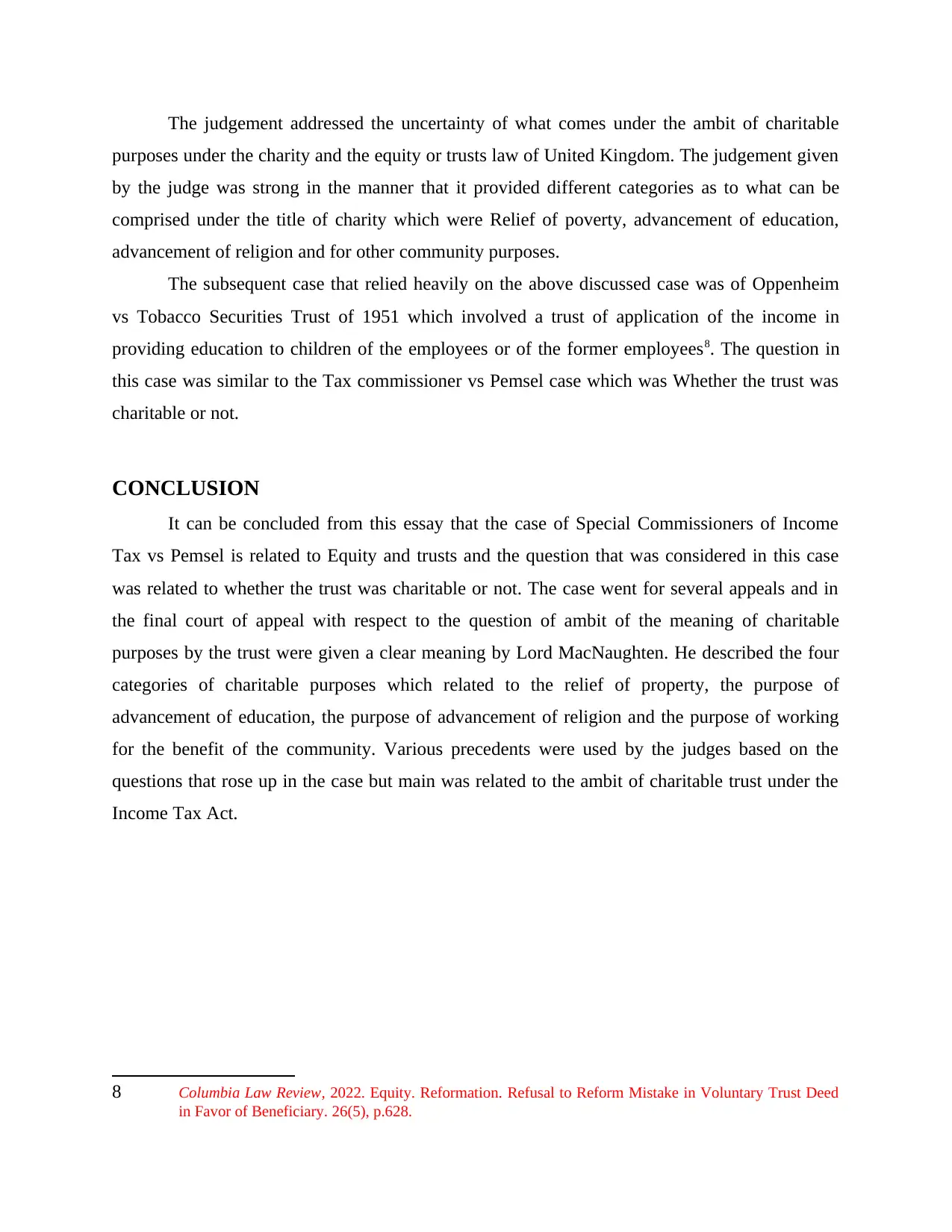
The judgement addressed the uncertainty of what comes under the ambit of charitable
purposes under the charity and the equity or trusts law of United Kingdom. The judgement given
by the judge was strong in the manner that it provided different categories as to what can be
comprised under the title of charity which were Relief of poverty, advancement of education,
advancement of religion and for other community purposes.
The subsequent case that relied heavily on the above discussed case was of Oppenheim
vs Tobacco Securities Trust of 1951 which involved a trust of application of the income in
providing education to children of the employees or of the former employees8. The question in
this case was similar to the Tax commissioner vs Pemsel case which was Whether the trust was
charitable or not.
CONCLUSION
It can be concluded from this essay that the case of Special Commissioners of Income
Tax vs Pemsel is related to Equity and trusts and the question that was considered in this case
was related to whether the trust was charitable or not. The case went for several appeals and in
the final court of appeal with respect to the question of ambit of the meaning of charitable
purposes by the trust were given a clear meaning by Lord MacNaughten. He described the four
categories of charitable purposes which related to the relief of property, the purpose of
advancement of education, the purpose of advancement of religion and the purpose of working
for the benefit of the community. Various precedents were used by the judges based on the
questions that rose up in the case but main was related to the ambit of charitable trust under the
Income Tax Act.
8 Columbia Law Review, 2022. Equity. Reformation. Refusal to Reform Mistake in Voluntary Trust Deed
in Favor of Beneficiary. 26(5), p.628.
purposes under the charity and the equity or trusts law of United Kingdom. The judgement given
by the judge was strong in the manner that it provided different categories as to what can be
comprised under the title of charity which were Relief of poverty, advancement of education,
advancement of religion and for other community purposes.
The subsequent case that relied heavily on the above discussed case was of Oppenheim
vs Tobacco Securities Trust of 1951 which involved a trust of application of the income in
providing education to children of the employees or of the former employees8. The question in
this case was similar to the Tax commissioner vs Pemsel case which was Whether the trust was
charitable or not.
CONCLUSION
It can be concluded from this essay that the case of Special Commissioners of Income
Tax vs Pemsel is related to Equity and trusts and the question that was considered in this case
was related to whether the trust was charitable or not. The case went for several appeals and in
the final court of appeal with respect to the question of ambit of the meaning of charitable
purposes by the trust were given a clear meaning by Lord MacNaughten. He described the four
categories of charitable purposes which related to the relief of property, the purpose of
advancement of education, the purpose of advancement of religion and the purpose of working
for the benefit of the community. Various precedents were used by the judges based on the
questions that rose up in the case but main was related to the ambit of charitable trust under the
Income Tax Act.
8 Columbia Law Review, 2022. Equity. Reformation. Refusal to Reform Mistake in Voluntary Trust Deed
in Favor of Beneficiary. 26(5), p.628.

REFERENCES
Platsas A, 'Sukhninder Panesar, Exploring Equity And Trusts' (2010) 44 The Law Teacher
Evans S, 'Graham Virgo,The Principles Of Equity And Trustsphilip H. Pettit,Equity And The Law Of Trusts Steve
Evans' (2013) 47 The Law Teacher
Fisher J, 'Alastair Hudson, Equity And Trusts' (2016) 51 The Law Teacher
Meagher J, 'Claims To Traceable Proceeds: Law, Equity And The Control Of Assets' [2018] Trusts & Trustees
Blackham A, 'The Presumption Of Advancement: A Lingering Shadow In UK Law?: Table 1' (2015) 21 Trusts &
Trustees
Michigan Law Review, 2021. Deeds: Reservation: Effect in Equity: Implied Trust. 1(8), p.681.
Michigan Law Review, 2020. Equity: Wills: Precatory Trust. 5(1), p.57.
Columbia Law Review, 2022. Equity. Reformation. Refusal to Reform Mistake in Voluntary Trust Deed in Favor of
Beneficiary. 26(5), p.628.
Platsas A, 'Sukhninder Panesar, Exploring Equity And Trusts' (2010) 44 The Law Teacher
Evans S, 'Graham Virgo,The Principles Of Equity And Trustsphilip H. Pettit,Equity And The Law Of Trusts Steve
Evans' (2013) 47 The Law Teacher
Fisher J, 'Alastair Hudson, Equity And Trusts' (2016) 51 The Law Teacher
Meagher J, 'Claims To Traceable Proceeds: Law, Equity And The Control Of Assets' [2018] Trusts & Trustees
Blackham A, 'The Presumption Of Advancement: A Lingering Shadow In UK Law?: Table 1' (2015) 21 Trusts &
Trustees
Michigan Law Review, 2021. Deeds: Reservation: Effect in Equity: Implied Trust. 1(8), p.681.
Michigan Law Review, 2020. Equity: Wills: Precatory Trust. 5(1), p.57.
Columbia Law Review, 2022. Equity. Reformation. Refusal to Reform Mistake in Voluntary Trust Deed in Favor of
Beneficiary. 26(5), p.628.
⊘ This is a preview!⊘
Do you want full access?
Subscribe today to unlock all pages.

Trusted by 1+ million students worldwide
1 out of 9
Related Documents
Your All-in-One AI-Powered Toolkit for Academic Success.
+13062052269
info@desklib.com
Available 24*7 on WhatsApp / Email
![[object Object]](/_next/static/media/star-bottom.7253800d.svg)
Unlock your academic potential
Copyright © 2020–2026 A2Z Services. All Rights Reserved. Developed and managed by ZUCOL.




